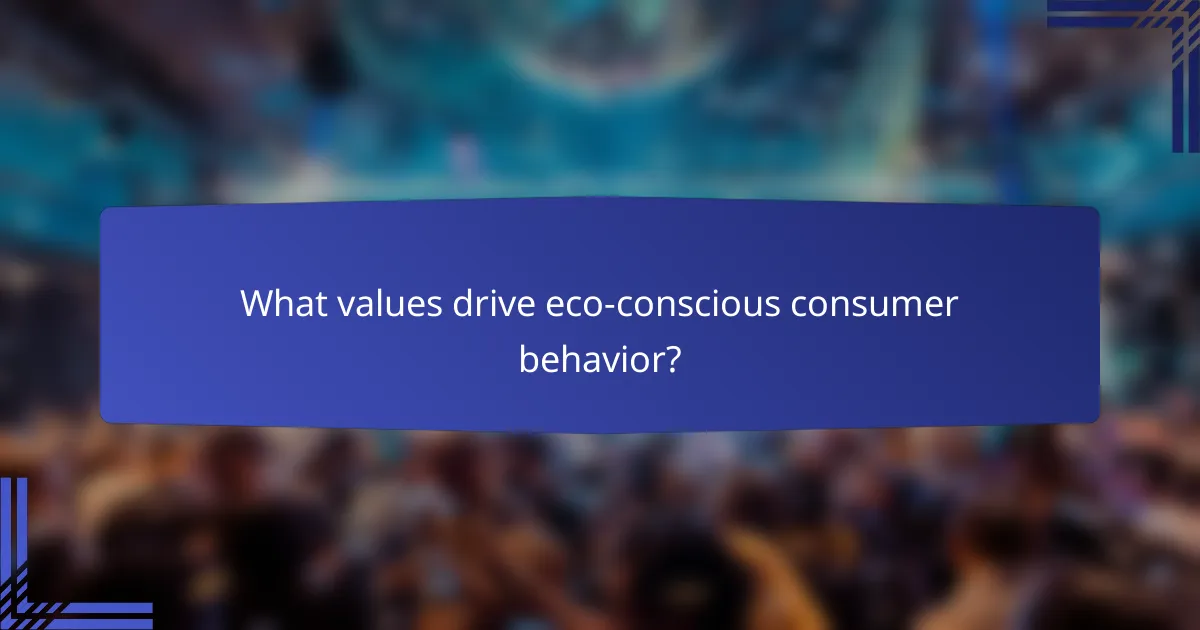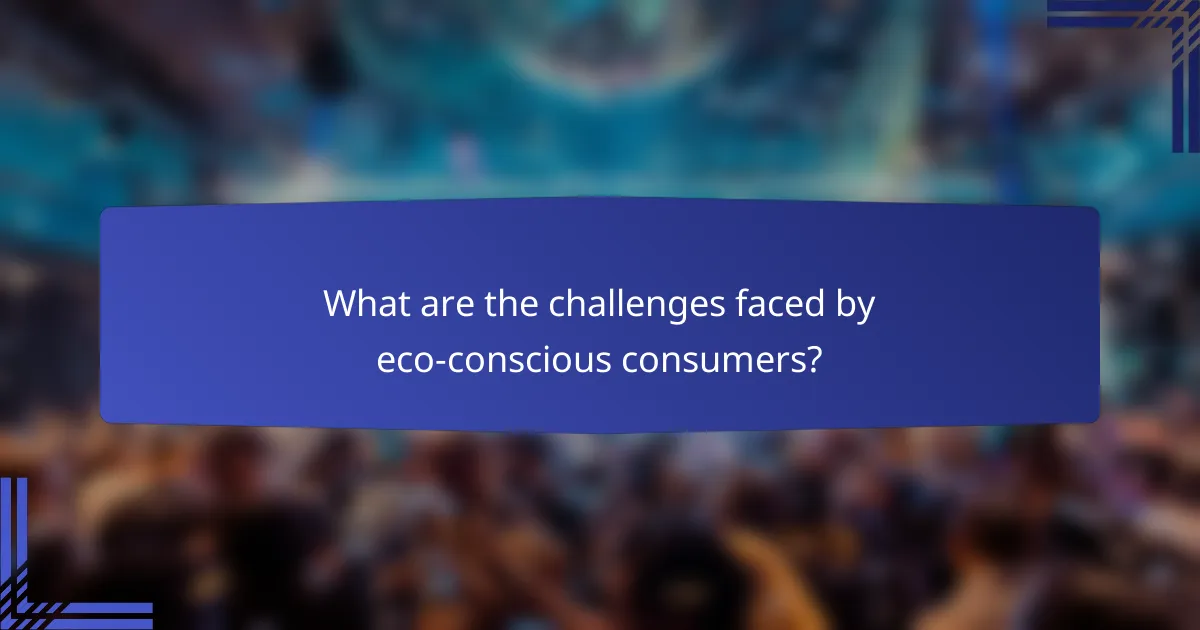Eco-conscious consumers are increasingly driven by a commitment to environmental protection, health, and social responsibility. Their purchasing decisions reflect a strong preference for sustainable products that align with their values, emphasizing ethical production and community support. By prioritizing brands that demonstrate a commitment to sustainability, these consumers actively contribute to a more responsible marketplace.

What motivates eco-conscious consumers in the United States?
Eco-conscious consumers in the United States are primarily motivated by a desire to protect the environment, promote health, and support social causes. These motivations drive their purchasing decisions and influence their lifestyle choices, leading them to seek products that align with their values.
Environmental sustainability
Environmental sustainability is a key motivation for eco-conscious consumers, who prioritize products that minimize harm to the planet. This includes choosing items made from renewable resources, reducing waste, and supporting brands that practice sustainable manufacturing. For example, consumers may opt for biodegradable packaging or products made from recycled materials.
To make environmentally sustainable choices, consumers can look for certifications such as Energy Star, USDA Organic, or Fair Trade. These labels indicate adherence to specific environmental standards and practices, helping consumers make informed decisions about their purchases.
Health and wellness
Health and wellness significantly influence the decisions of eco-conscious consumers, who often seek products that are free from harmful chemicals and additives. Many individuals believe that eco-friendly products are not only better for the environment but also healthier for themselves and their families. This includes organic foods, natural cleaning supplies, and non-toxic personal care items.
When selecting health-conscious products, consumers should consider looking for labels that indicate organic or non-GMO certifications. These labels can provide assurance that the products are produced without synthetic pesticides or genetically modified organisms, aligning with their wellness goals.
Social responsibility
Social responsibility is another important factor for eco-conscious consumers, who often support brands that demonstrate a commitment to ethical practices and community engagement. This can involve purchasing from companies that prioritize fair labor practices, support local economies, or contribute to social causes. For instance, some consumers may choose to buy from brands that donate a portion of their profits to environmental or social initiatives.
To engage in socially responsible purchasing, consumers can research companies’ missions and values, looking for transparency in their operations. Engaging with brands that actively promote social change can enhance the consumer’s sense of connection and impact, reinforcing their commitment to responsible consumption.

How do eco-conscious consumers make purchasing decisions?
Eco-conscious consumers prioritize sustainability and environmental impact when making purchasing decisions. They often seek products that align with their values, focusing on factors such as sourcing, certifications, and brand reputation.
Researching product origins
Eco-conscious consumers typically start by investigating where products come from. They look for transparency in sourcing, favoring items made from sustainable materials or produced locally to reduce carbon footprints. For example, a consumer may choose organic cotton clothing over conventional cotton due to its lower environmental impact.
Online resources, brand websites, and product labels are valuable tools for understanding product origins. Shoppers can use apps that scan barcodes to reveal detailed information about a product’s supply chain, helping them make informed choices.
Evaluating certifications
Certifications play a crucial role in the decision-making process for eco-conscious consumers. They often look for labels such as USDA Organic, Fair Trade, or Energy Star, which indicate adherence to specific environmental and ethical standards. These certifications provide assurance that products meet certain sustainability criteria.
However, not all certifications are created equal. Consumers should familiarize themselves with reputable certifications and be cautious of misleading labels. Checking for third-party verification can help ensure that claims are legitimate.
Comparing eco-friendly brands
When choosing between eco-friendly brands, consumers often compare their practices, values, and product offerings. They may evaluate factors such as a brand’s commitment to sustainability, community involvement, and overall environmental impact. For instance, a brand that uses recycled materials and supports local communities may be favored over one that only markets itself as “green.”
To streamline this comparison, consumers can create a checklist of criteria that matter most to them, such as packaging, ingredient sourcing, and ethical labor practices. This approach helps in making side-by-side evaluations of different brands, ensuring that their purchases align with their eco-conscious values.

What values drive eco-conscious consumer behavior?
Eco-conscious consumer behavior is primarily driven by values such as sustainability, ethical production, and community support. Consumers prioritize choices that align with their beliefs about protecting the environment and promoting social responsibility.
Commitment to reducing waste
Many eco-conscious consumers actively seek to minimize waste in their daily lives. This can involve choosing products with minimal packaging, opting for reusable items, or participating in recycling programs. For example, using a reusable water bottle instead of single-use plastic can significantly reduce waste over time.
To effectively reduce waste, consumers can adopt practices like composting organic materials and shopping at bulk stores to limit packaging. Setting personal goals, such as reducing household waste by a certain percentage, can also motivate individuals to make more sustainable choices.
Support for ethical brands
Eco-conscious consumers often prefer brands that demonstrate ethical practices, including fair labor conditions and environmentally friendly production methods. They may research companies to ensure their values align with their own, looking for certifications such as Fair Trade or organic labels.
Supporting ethical brands not only promotes responsible business practices but also encourages other companies to adopt similar values. Consumers can make informed choices by reading product labels and seeking out brands that prioritize sustainability and social responsibility.
Preference for local products
Choosing local products is a key value for many eco-conscious consumers, as it supports local economies and reduces carbon footprints associated with transportation. Buying from local farmers’ markets or small businesses can foster community connections and promote sustainable practices.
To enhance their local purchasing habits, consumers can explore community-supported agriculture (CSA) programs or local artisans. This not only helps the environment but also provides fresher, seasonal products that often have a smaller ecological impact compared to imported goods.

How do eco-conscious consumers prioritize product attributes?
Eco-conscious consumers typically prioritize product attributes based on sustainability, energy efficiency, and recyclability. These factors significantly influence their purchasing decisions, as they seek to minimize environmental impact while meeting their needs.
Material sustainability
Material sustainability refers to the use of renewable, biodegradable, or recycled materials in products. Eco-conscious consumers often favor items made from organic cotton, bamboo, or recycled plastics, as these materials reduce resource depletion and pollution.
When evaluating material sustainability, consumers should look for certifications such as the Global Organic Textile Standard (GOTS) or Forest Stewardship Council (FSC) labels. These certifications indicate adherence to environmental and social standards, providing assurance of a product’s sustainability.
Energy efficiency
Energy efficiency is a critical attribute for eco-conscious consumers, who prefer products that consume less energy during use. Items like Energy Star-rated appliances or LED lighting are popular choices, as they help reduce electricity bills and lower carbon footprints.
To assess energy efficiency, consumers can compare the energy consumption ratings of similar products. Opting for appliances with higher efficiency ratings can lead to significant savings over time, making it a practical choice for environmentally aware shoppers.
Packaging recyclability
Packaging recyclability is an essential consideration for eco-conscious consumers, who often prefer products with minimal or recyclable packaging. This choice helps reduce waste and encourages responsible disposal practices.
When selecting products, consumers should check for recycling symbols and guidelines on packaging. Avoiding items with excessive plastic or non-recyclable materials can significantly contribute to waste reduction efforts and promote a circular economy.

What are the challenges faced by eco-conscious consumers?
Eco-conscious consumers encounter several challenges that can hinder their ability to make sustainable choices. These include higher costs for sustainable products, limited availability in local markets, and concerns about misleading marketing practices known as greenwashing.
Higher costs of sustainable products
One of the primary challenges for eco-conscious consumers is the higher costs associated with sustainable products. Often, these items are priced at a premium compared to conventional alternatives due to more expensive production processes and sourcing of materials.
For instance, organic foods and eco-friendly household items may cost 20-50% more than their non-sustainable counterparts. Consumers should weigh the benefits of sustainability against their budget and consider buying in bulk or during sales to mitigate costs.
Lack of availability
Another significant hurdle is the lack of availability of sustainable products in many regions. While larger cities may offer a variety of eco-friendly options, rural areas often have limited access to such goods.
To overcome this challenge, consumers can explore online retailers that specialize in sustainable products or consider local farmers’ markets for fresh, organic produce. Joining community-supported agriculture (CSA) programs can also provide access to sustainable food sources.
Greenwashing concerns
Greenwashing poses a critical challenge for eco-conscious consumers, as it involves companies misleadingly promoting their products as environmentally friendly. This can make it difficult for consumers to identify genuinely sustainable options.
To navigate this issue, consumers should look for certifications from reputable organizations, such as USDA Organic or Fair Trade, which can help verify a product’s sustainability claims. Researching brands and reading reviews can also provide insights into their actual environmental impact.
